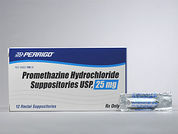See also Warning section.
Before using promethazine, tell your doctor or pharmacist if you are allergic to it; or to any other phenothiazines (such as prochlorperazine); or if you have any other allergies. This product may contain inactive ingredients, which can cause allergic reactions or other problems. Talk to your pharmacist for more details.
Before using this medication, tell your doctor or pharmacist your medical history, especially of: breathing problems (such as asthma, chronic obstructive pulmonary disease-COPD, sleep apnea), blood/immune system problems (such as bone marrow depression), high pressure in the eye (glaucoma), heart disease (such as irregular heartbeat), high blood pressure, liver disease, certain brain disorders (such as neuroleptic malignant syndrome, Reye's syndrome, seizures), stomach/intestine problems (such as blockage, ulcer), overactive thyroid (hyperthyroidism), difficulty urinating (for example, due to enlarged prostate).
This drug may make you dizzy or drowsy or blur your vision. Alcohol or marijuana (cannabis) can make you more dizzy or drowsy. Do not drive, use machinery, or do anything that needs alertness or clear vision until you can do it safely. Avoid alcoholic beverages. Talk to your doctor if you are using marijuana (cannabis).
Before having surgery, tell your doctor or dentist about all the products you use (including prescription drugs, nonprescription drugs, and herbal products).
This medication may make you more sensitive to the sun. Limit your time in the sun. Avoid tanning booths and sunlamps. Use sunscreen and wear protective clothing when outdoors. Tell your doctor right away if you get sunburned or have skin blisters/redness.
This medication may make you sweat less, making you more likely to get heat stroke. Avoid doing things that may cause you to overheat, such as hard work or exercise in hot weather, or using hot tubs. When the weather is hot, drink a lot of fluids and dress lightly. If you overheat, quickly look for a place to cool down and rest. Get medical help right away if you have a fever that does not go away, mental/mood changes, headache, or dizziness.
Children may be more sensitive to the side effects of this drug, especially slowed breathing and uncontrolled movements (see also Warning section). This drug can often cause excitement in young children instead of drowsiness. Special care should be taken when using this medication in children who have lost a lot of fluid (dehydration), those who have a family history of sudden infant death syndrome (SIDS), and those who are hard to wake up from sleep.
Older adults may be more sensitive to the side effects of this drug, especially drowsiness, confusion, constipation, or trouble urinating. Drowsiness and confusion can increase the risk of falling.
During pregnancy, this medication should be used only when clearly needed. Discuss the risks and benefits with your doctor.
It is unknown if promethazine passes into breast milk. Consult your doctor before breastfeeding.



